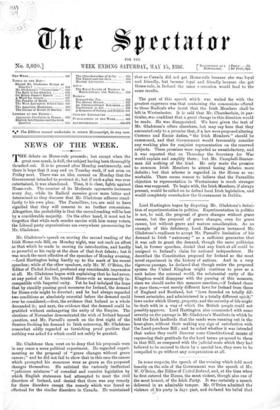Lord Hartington began by disputing Mr. Gladstone's defini- tion of
experimentation in politics. Experimentation in politics is not, he said, the proposal of grave changes without grave causes, but the proposal of grave changes, even for grave causes, but without grave and mature consideration. As an example of this deficiency, Lord Hartington instanced Mr. Gladstone's readiness to accept Mr. Parnell's limitation of his demand to Irish " autonomy " as a sufficient guarantee that it was safe to grant the demand, though the same politician had, in former speeches, denied that any limit at all could be assigned to Ireland's claim for national independence. He described the Constitution proposed for Ireland as the most novel experiment in the history of nations. And in a very vigorous passage, he declared that though under the proposed system the United Kingdom might continue to pose as a unit before the external world, the substantial unity of the Kingdom would disappear with the passing of this measure, since we should under this measure sanction,—if Ireland chose to pass them,—not merely different laws for Ireland from those of England and Scotland, but " laws founded on totally dif- ferent principles, and administered in a totally different spirit," laws under which liberty, property, and the security of life might be dealt with in a way of which the British people could not possibly approve. Lord Hartington also commented with some severity on the passage in Mr. Gladstone's Manifesto in which he told the Irish landlords that the sands were running out in the hour-glass, without their making any sign of satisfaction with the Land-purchase Bill ; and he asked whether it was intended that unless they could discover some Constitutional means of expressing their gratitude for the hard terms proposed to them in that Bill, as compared with the judicial rents which they had believed to be secured to them by a special law, they were to be compelled to go without any compensation at all.


































